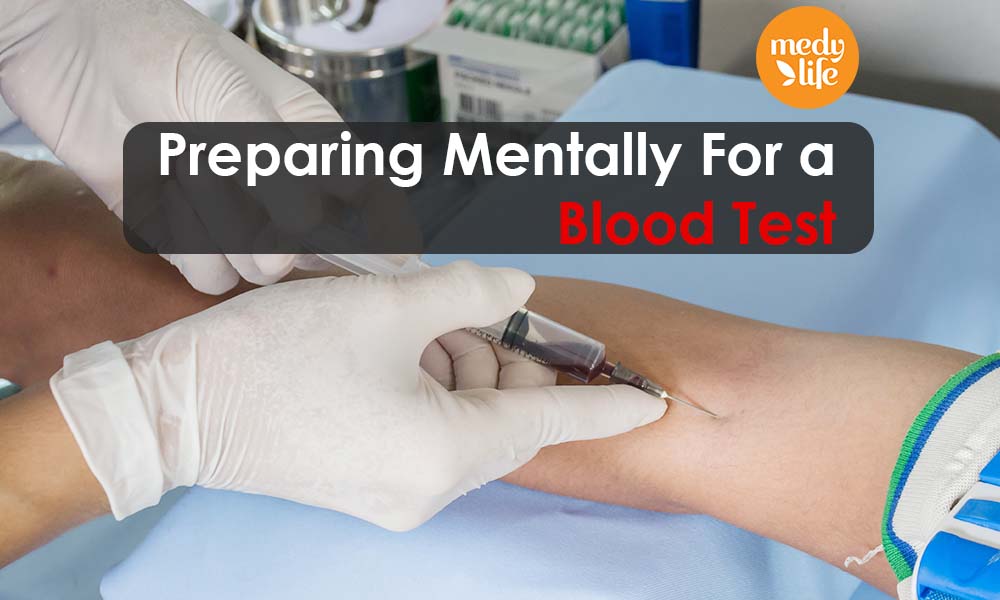
Preparing Mentally For a Blood Test
28-06-2019 | Posted By: Chhavi | 6316 View(s)
Scared of a Blood Test? Do not worry, as you are not the only one who is afraid of injections and cannot stand the sight of blood. Many people avoid Blood Tests and routine health checkups only because they are scared of needles and injections. Well, say goodbye to your worries as there are some simple ways and tips which can help you to get prepared mentally for the Test.
What is a Blood Test?
Blood Test is a very common and simple test which helps the Doctors to evaluate the health condition of the patient and check for certain diseases and conditions. Most of these tests do not require any special preparations. But, for some tests, fasting is required. A blood test is done very simply. During the test, a small sample of the blood is taken from the vein, using a needle. ‘Phlebotomist’ is a person who draws the blood.

Specifically, Blood Tests Help in:
1. Evaluating how well the patient’s body organs such as the kidneys, thyroid, liver, heart etc are working.
2. Diagnosing diseases and health conditions such as Cancer, Diabetes, Heart diseases, HIV/AIDS, etc.
3. Check whether the medicines taken by patients are working or not
The results of the test help in detecting various health conditions at an early stage. Many times, other tests are also required along with Blood tests to confirm the diagnosis.

How to Prepare for a Blood Test?
Most people avoid going for a lab test because they feel too scared. But stay calm as there is nothing to worry about. Sure, getting a needle stuck in the arm can be quite painful and uncomfortable. Thus, one must prepare themselves both physically and mentally before a blood test to ensure a smooth draw. However, the good news is that these days blood tests are carried out by using new age needles which do not cause much pain as compared to the conventional needles which were used earlier.
The below-mentioned tips can help you get prepared for the test:
1. Have a Word with the Doctor
Before going for the test, one must talk to the Doctor to get brief instructions and knowledge about the test. There are certain Blood Tests which require special preparation to get accurate results. For instance, there are some tests which require overnight fasting. Thus, always have a word with the Doctor to know all about the instructions related to the test.
Also, certain substances such as prescribed medications, alcohol, vitamins, recreational drugs and blood thinners can alter the results of the test. Thus, discuss with the Doctor if you are taking any of these or some other substance so that they can determine the right time for the test to be done. The key point is that one must tell proper medical history to the Doctor and ask the Doctor for instructions about the test.
2. Stay Hydrated
When we are hydrated, it is easier to find the veins as they are bigger. Also, the blood is not so thick and flows easily into the tube. Thus, make sure to drink plenty of water before going for the test. If fasting is required for the test, then make sure to drink lots of water before you start the fasting. It is because being well-hydrated makes it a lot easier to draw the blood.

3. Avoid Certain Activities
There are some activities like smoking, drinking, sexual activity, heavy exercises which can alter the results of some blood tests. If the doctor asks you to stay away from certain activities before the lab test; ensure that you refrain from those activities.
4. Use a Warm Compress
Before going for the test, make sure that you warm the extremity where the blood will be drawn. One can use a warm compress for 10 to 15 minutes over the area to improve the blood flow to that area.
Warm clothes also help the phlebotomist to find the vein and draw the blood. It is because warm clothes increase the blood flow by increasing the skin temperature which makes it easier for the phlebotomist to find the vein.
5. Be Calm and Don’t Take any Stress
When someone feels nervous about the lab test, it increases their stress and anxiety levels. The unfortunate part is that when we are stressed, our blood pressure increases which constrict our veins. And the result is that it then becomes very difficult to draw the blood out of the vein.
If a person is calm and is not taking any stress, there are high chances that the phlebotomist will find the vein in very less time.
To reduce stress one can:
• Take short, deep breaths.
• Positive Self-Talk- Repeat inside your head, ‘I can do this’, ‘There is nothing hard in this. It is easy.’
• Listen to soothing music before going for the test.
• Talk to a Friend before going for the test.
Just know it is a simple test and it doesn’t hurt. So, avoid stress to make the procedure of the test easier.

6. Accept Your Feelings of Anxiety
Anxiety is a normal emotion just like others, and like every other emotion, it can be controlled if you want to. Do not let feelings control you, be strong and control your feelings. Accepting the fact that you are anxious will take away the power away from the feeling.
You will feel like you are the boss when you accept that ‘Yes, I am feeling this, but I will not let this feeling control me.’ Once you accept it, it will be easy to not think about it. The more you try to avoid those feelings, the more you will become overwhelmed, and then it will be hard to control anxiety.

7. Question Your Fears
Our mind plays a lot of tricky games when we are scared and anxious. All the negative thoughts will come in your mind like ‘Blood tests are harmful’, ‘It will pain a lot’, ‘I don’t need to go for a test, I am fine.’ and much more.
But, one has to know that these are just trick games the mind plays to get out of the situation. One has to be strong and question their negative thoughts and fear and replace them with positive ones.
For instance, if your mind says, ‘Blood tests are harmful and dangerous’; replace it with a positive statement, ‘Blood tests are not harmful. I haven’t seen anybody getting hurt from these tests.’
Also, if you are too anxious, ask yourself questions like:
What will be the consequences if I don’t go for the test?
Does it really hurt that bad or is it just my fear?
Is my fear realistic?
What is the worst thing that can happen when my blood is drawn?
What are the chances that any bad thing will happen?
When you repeatedly ask these questions, it will help you give realistic answers and build awareness that nothing bad is going to happen.
8. Positive Self Talk
Self-talk is the voice in our inner voice; basically, it is the voice in our mind which says things that we do not necessarily say out aloud. What we say in our mind affects how we feel about ourselves.
Positive self-talk makes us feel good about ourselves and helps us have an optimistic approach towards the situation. Thus, we must practice positive self-talk before going for the test so that we can reduce the feelings of anxiety and handle the situation in a positive way.
So, now no need to get scared of needles and injections before going for the Blood Test as there are many ways by which you can eliminate that fear. The tips mentioned above will help you to get prepared for the test both physically and mentally. However, always make sure to Get yourself tested by qualified Phlebotomist who uses high-quality Kits. Let the Phlebo use only Fresh Needles opened from a Sealed packet in front of your eyes for testing and ensure that they wear a Glove before Drawing the sample. Needless to say that the Testing should be done from an Accredited Lab which follows recommended Guidelines and ensures compliance to Quality Standards and reporting.
Make sure to go for a Health Checkup on a regular basis as our health can deteriorate anytime- It is always better to stay alert when it comes to health! Stay Protected, Stay Healthy Always!


